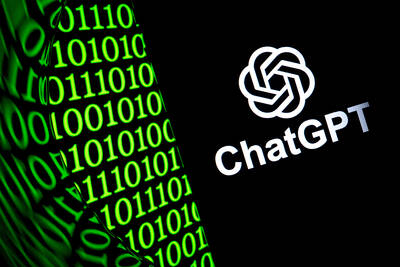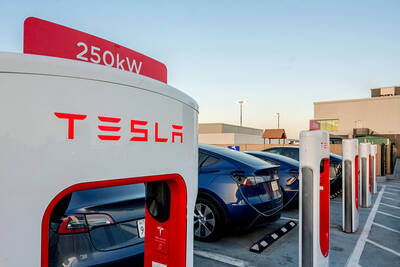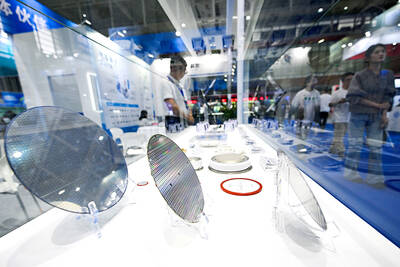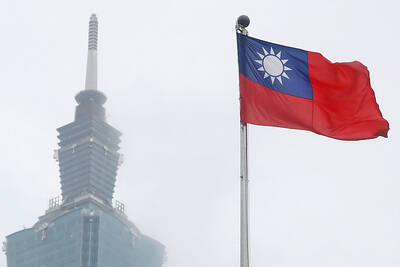President-elect Ma Ying-jeou (馬英九) yesterday defended his target of 6 percent annual economic growth, saying that closer trade ties with China would help create a “mini boom.”
“It’s a tough job for sure, but we can only achieve our ideas to revitalize our economy by having this target, otherwise we won’t be able to do it,” Ma told AFP.
Ma swept to a landslide victory in March largely on pledges to improve the economy; one of those pledges was a target of 6 percent annual economic growth.
The government has forecast growth of 4.32 percent this year, after the economy enjoyed 6.39 percent growth in the final quarter of 2007 and 5.13 percent growth for the first quarter of this year.
The World Bank last month forecast the economy’s expansion would slow to 4.3 percent this year as a slowdown spreads in the US, weakening demand for exports.
Although high oil and food prices would “set a very difficult ceiling” for growth, Ma said that expanding air links with China and opening Taiwan to Chinese tourists would create a “mini-boom” that would boost the economy.
Vice president-elect Vincent Siew (蕭萬長) also said yesterday that the economy may fail to achieve 6 percent growth this year, but he restated plans to spend NT$3.99 trillion (US$131 billion) on 12 projects over eight years to boost domestic demand.
“International economic conditions are not very good in the first half,” Siew said during a speech in Taipei. “It will be difficult for us to reach 6 percent GDP growth this year.”

OpenAI has warned US lawmakers that its Chinese rival DeepSeek (深度求索) is using unfair and increasingly sophisticated methods to extract results from leading US artificial intelligence (AI) models to train the next generation of its breakthrough R1 chatbot, a memo reviewed by Bloomberg News showed. In the memo, sent on Thursday to the US House of Representatives Select Committee on China, OpenAI said that DeepSeek had used so-called distillation techniques as part of “ongoing efforts to free-ride on the capabilities developed by OpenAI and other US frontier labs.” The company said it had detected “new, obfuscated methods” designed to evade OpenAI’s defenses

NEW IMPORTS: Car dealer PG Union Corp said it would consider introducing US-made models such as the Jeep Grand Cherokee and Stellantis’ RAM 1500 to Taiwan Tesla Taiwan yesterday said that it does not plan to cut its car prices in the wake of Washington and Taipei signing the Agreement on Reciprocal Trade on Thursday to eliminate tariffs on US-made cars. On the other hand, Mercedes-Benz Taiwan said it is planning to lower the price of its five models imported from the US after the zero tariff comes into effect. Tesla in a statement said it has no plan to adjust the prices of the US-made Model 3, Model S and Model X as tariffs are not the only factor the automaker uses to determine pricing policies. Tesla said

China’s top chipmaker has warned that breakaway spending on artificial intelligence (AI) chips is bringing forward years of future demand, raising the risk that some data centers could sit idle. “Companies would love to build 10 years’ worth of data center capacity within one or two years,” Semiconductor Manufacturing International Corp (SMIC, 中芯) cochief executive officer Zhao Haijun (趙海軍) said yesterday on a call with analysts. “As for what exactly these data centers will do, that hasn’t been fully thought through.” Moody’s Ratings projects that AI-related infrastructure investment would exceed US$3 trillion over the next five years, as developers pour eye-watering sums

Bank of America Corp nearly doubled its forecast for the nation’s economic growth this year, adding to a slew of upgrades even after a rip-roaring last year propelled by demand for artificial intelligence (AI). The firm lifted its projection to 8 percent from 4.5 percent on “relentless global demand” for the hardware that Taiwanese companies make, according to a note dated yesterday by analysts including Xiaoqing Pi (皮曉青). Taiwan’s GDP expanded 8.63 percent last year, the fastest pace since 2010. The increase “reflects our sustained optimism over Taiwan’s technology driven expansion and is reinforced by several recent developments,” including a more stable currency,